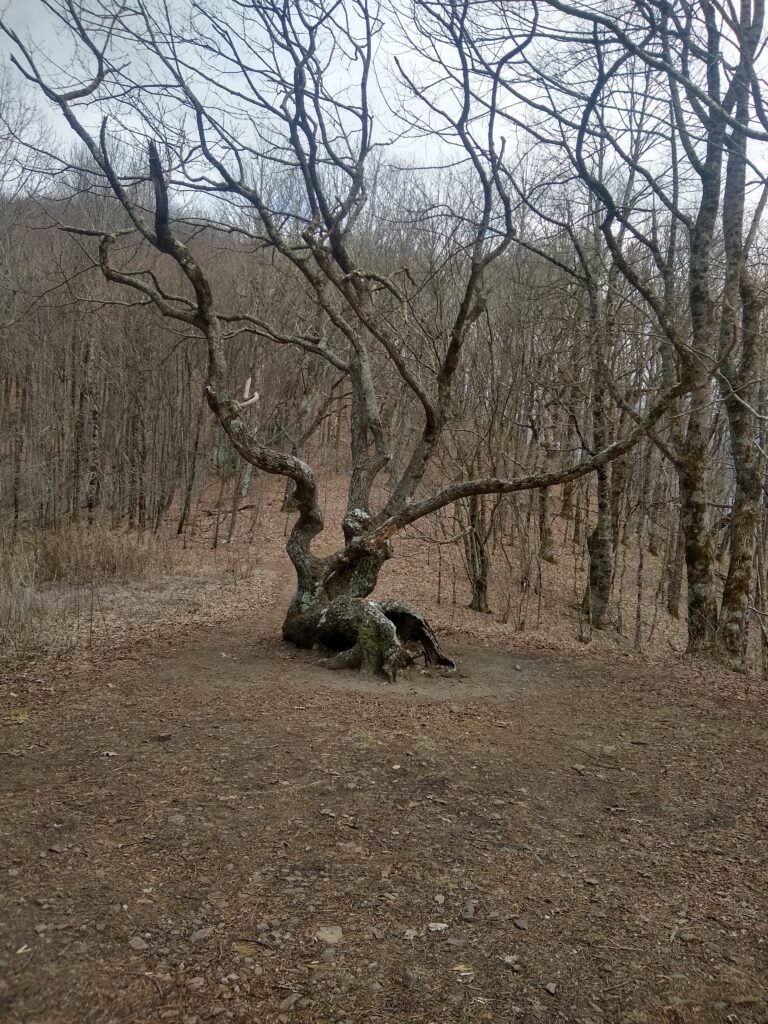One of the things I like best about the Appalachian Mountains is how much history they’ve seen. In the scheme of what humans can observe directly, without technological aid, they’re about as close to immortal as it gets.
Born nearly 500 million years ago in an intercontinental crash, the Appalachians are not just older than humans, and not just primates, and not just mammals, and not even just dinosaurs; they’re older than most land- and air-based life.
Vertebrate fish had just developed in the oceans, and relatives of modern ferns had begun to grow on land. The planet was mostly ocean, with a single supercontinent around the south pole. At its center was the Pangean range, which was then as tall as the Himalayas.
As the supercontinent broke apart, so did the range. The Appalachian Mountains, the Scottish Highlands, and the Atlas Mountains of Morocco are all geological descendents of that divorce (and, in fact, many Scottish immigrants settled in Appalachia because it reminded them of home).
Walking on something so ancient is centering in a way only the soul understands. It feels like the home of old gods, worn down enough to liveable for all the balding, out-of-shape demigods in the family. It’s seen hundreds of millions of winter-spring-summer-fall cycles, each with impossibly more consequential events than any one person’s (or even all of them) problems.
I’ve noticed many hikers touch the Appalachians in respectful, almost deifying ways. Many habitually “knock on wood,” asking the Appalachians to tug fate to their side. Rather than cut signs markers into trees or scratch them into the soil, hikers arrange rocks or twigs. Plenty of grown adults pet moss.
When Rachel and I meet old-growth trees, or during an especially difficult climb, we put our hands on them for energy. We say nice things to the trees, just like we do our cat. We avoid walking off-trail, or breaking live branches, or, heaven forbid, littering, not just to protect the natural environment, but to protect ourselves.
I realize I’m being superstitious. But, for what it’s worth, Rachel and I have been very lucky on our hike.
Neither of us has been injured. We’ve been near or under a roof for some of the worst rains, and in a real, heated room for the coldest temperatures. We’ve come into food, and into toilet paper, just after running out of each.
The mountains have a power and a pull that isn’t easily explained. Why is it that people of so many different traditions gravitate to geological formations? They can’t easily be farmed or built upon. They’re neither safe nor calorically efficient to cross.
Every culture and religion I know of weaves stories around and attaches symbolic meaning to the mountains. Cherokee mounds — and, I strongly suspect, sites of religious significance to other tribes — are located just miles from the AT. Mecca is located in the middle of an Arabian mountain range. Mt. Sinai is where Moses, according to Judeo-Christian history, received the Ten Commandments from God. Sites in the Himalayas hold religious meaning to Sikhs, Buddhists, Hindus, and Jains.
I wonder sometimes whether humans have a pseudo-sense, similar to how birds sense magnetic fields, of the divine. If there’s anywhere I feel it, a comfortable awe, it’s in the Appalachians.
I don’t know whether greater beings actually inhabit mountain ranges, or whether it’s just a human way to process places carved by unfathomable amounts of energy and time. But I wouldn’t be the first, or even the billionth, to imagine them there. And — knocking on wood — operating as if they are seems to be working for us.

One reply on “The Appalachians’ Pull: The Part I’ve Had Trouble Putting My Finger On”
Bob, thank you for the historical and cultural lessons in ‘The Appalachians’ Pull’. Your philosophical musings were also amusing. Nicely done!